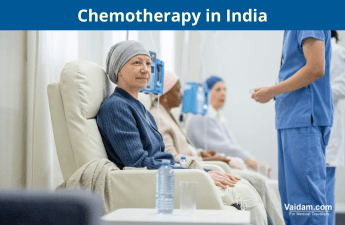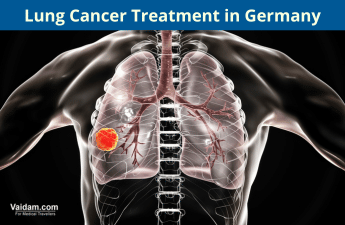Dr Vaishnavi Jeyasingam has 16 years of experience as a Medical oncologist. Her main area of interest is immunotherapy, which includes things like intensity-modulated radiotherapy, targeted treatment, and cancer pain management. she is also awarded Dean's List Recipient, Mbbs (UM), in 2005 Excellence of Service Award, Ministry of Health, in 2016. She is presently associated with ParkCity Medical Centre, Kuala Lumpur which is one of the leading hospitals in Malaysia.
She graduated from University Malaya with MBBS in 2005 and a postgraduate degree in clinical oncology in 2013. She is a member of the Malaysian Oncological Society, the European Society of Medical Oncology, and the Academy of Medicine, among other organisations. She has worked for various hospitals including Princess Alexandra Hospital, Brisbane in Australia, Auckland City Hospital in Auckland, New Zealand, Hospital Kuala Lumpur, University Malaya Medical Center, University Kebangsaan Malaysia, Hospital Sultan Ismail, Johor, Hospital Selayang.
List of some of the treatments provided by Dr Vaishnavi Jeyasingam
- chemotherapy
- Acute Lymphocytic Leukemia - ALL in Adults
- Breast Biopsy
- Hairy Cell Leukemia - HCL
Cancer Treatment Types
Cancer produces uncontrollable cell division. This can lead to cancers, immune system damage, and other life-threatening conditions.
The term "cancer" is a wide one. It is a condition that occurs when biological alterations result in unregulated cell growth and division.
Some cancers promote fast cell proliferation, while others cause cells to divide and develop more slowly. Some cancers, such as leukaemia, produce visible tumours, while others, such as breast cancer, do not.
The majority of the cells in the body have defined roles and lifespans. While cell death may appear to be a negative phenomenon, it is a normal and helpful process known as apoptosis.
A cell is told to die so that the body can replace it with a fresher, better-functioning cell. The components that tell cancerous cells to cease proliferating and die are missing. As a result, they accumulate throughout the body, consuming oxygen and nutrients meant for other cells. Cancerous cells can create tumours, immune system impairment, and other alterations that hinder the body from operating normally.
Cancerous cells may develop in one location and then move to other parts of the body via lymph nodes. These are clumps of immunological cells that may be found throughout the body.
Treatment
There are several cancer therapies available. The kind and stage of your cancer, as well as your overall health and preferences, will all influence your treatment options. You and your doctor can decide which cancer therapy is best for you by evaluating the advantages and disadvantages of each option.
- Open Surgery: If you have a solid tumour in one place, surgery is the best way to treat cancer. It can't always treat cancer that has spread or cancer that has spread to your bloodstream, such as leukaemia. With a scalpel or other sharp tool, the surgeon creates an incision in your skin and removes as much of the tumour as possible. Lymph nodes and other tissues may also be removed for testing. This is referred to as open surgery.
- Chemotherapy: This powerful drug prevents cancer from spreading, slows its progression, or even kills cancer cells. Because it destroys fast-growing cells in your body, such as those in your blood, mouth, digestive system, and hair follicles, it might produce adverse effects. Chemotherapy medicines come in over a hundred different varieties. Your doctor will select the one that is most appropriate for your cancer kind. It's available as a tablet or capsule, a cream to apply to your skin or an injection or IV at home or in the hospital.
- Radiation therapy: Radiation treatment kills cancer cells by bombarding them with high-powered radiation beams like X-rays and protons. External beam radiation is delivered by a machine outside your body, whereas internal beam radiation is delivered by a machine within your body (brachytherapy).
- Bone marrow transplant: A stem cell transplant is another name for a bone marrow transplant. The substance inside your bones that produces blood cells is called bone marrow. Your cells or cells from a donor can be used in a bone marrow transplant. A bone marrow transplant allows your doctor to treat your cancer with greater chemotherapy dosages. It can also be used to replace bone marrow that has become diseased.
- Immunotherapy: Immunotherapy, often known as biological therapy, is a cancer treatment that makes use of your body's immune system. Because your immune system does not detect cancer as an intruder, it can thrive uncontrolled in your body. Immunotherapy can assist your immune system in "seeing" and attacking cancer.
- Hormone therapy: Some cancers are fuelled by hormones in the body. Breast cancer and prostate cancer are two examples. Cancer cells may cease developing if certain hormones are removed from the body or their effects are blocked.
- Targeted therapy: These are usually paired with other treatments. They’re strong medicine, like chemotherapy, but instead of killing all fast-growing cells, they home in on the parts of cancer cells that make them different from other cells. Targeted drugs do things like stop blood vessels from growing around cancer cells or turn off signals that tell cancer cells to grow. They can also tell your immune system to destroy them or change their proteins so they die.
Know more about Cancer Immunotherapy
The immune system is in charge of locating and defending the body against infection and illness. Cancer is a complicated illness that is capable of eluding and outwitting the immune system. It is frequently overlooked until it has become too tough to manage. Our immune system is used in immunotherapy to combat cancer. It aids the immune system in recognising and attacking cancer cells. Distinct kinds of immunotherapy have different mechanisms of action. Some immunotherapy therapies work by assisting the immune system in slowing or stopping cancer cell development. Others aid the immune system in the destruction of cancer cells or the prevention of cancer spreading to other regions of the body. Therapies for cancer immunotherapy can be used alone or in combination with other cancer treatments.
How does cancer immunotherapy work?
Certain elements of the immune system are employed in cancer immunotherapy to attack cancer in a variety of ways. Some biological treatments aim to strengthen the immune system in general, while others seek to train the immune system to target cancer cells specifically. Depending on the type of cancer a patient has, immunotherapy may be used alone or in conjunction with other treatments. All of the chemicals that are normally present in the body are tracked by the immune system. When the immune system identifies a material it doesn't recognise or considers "foreign," it triggers an immunological response to mark it for assault.
Germs and cancer cells, for example, include chemicals that the immune system does not identify as being present in the body ordinarily. This sets off an alert, prompting an immune response against pathogens or cancer cells.
However, the body's capacity to target cancer cells is limited, since many people get cancer despite having a robust immune system. When the immune system fails to detect cancer cells as foreign, these aberrant cells multiply uncontrollably, resulting in the formation of a tumour. In other situations, the immune system recognises cancer cells as foreign invaders, but the reaction it initiates is insufficient to eradicate the disease.
What are the types of immunotherapy?
Immune checkpoint inhibitors: Drugs that block immunological checkpoints are known as immune checkpoint inhibitors. These checkpoints are a natural element of the immune system that prevent overactive immune responses. These medicines inhibit them, allowing immune cells to respond more forcefully to malignancy.
T-cell transfer therapy: This is a therapy that enhances your T cells' natural ability to fight cancer. Immune cells from your tumour are extracted in this treatment. Those that are most effective in fighting cancer are chosen or modified in the lab to better kill cancer cells, produced in huge quantities, and injected back into your body using a vein needle. Adoptive cell therapy, adoptive immunotherapy, and immune cell therapy are all terms used to describe T-cell transfer treatment.
Monoclonal antibodies: which are laboratory-created immune system proteins that bind to particular sites on cancer cells. Some monoclonal antibodies are used to identify cancer cells so that the immune system can see and eliminate them more easily. Immunotherapy is a term that refers to the use of monoclonal antibodies. Therapeutic antibodies are another name for monoclonal antibodies.
Treatment vaccines: Treatment vaccines, which increase your immune system's reaction to cancer cells and so help you fight cancer. Vaccinations for treatment are not the same as vaccines for illness prevention.
Immune system modulators: Modulators of the immune system that boost the body's ability to fight cancer. Some of these drugs target specific areas of the immune system, while others have a broader impact on the immune system.
Dr Vaishnavi Jeyasingam is the best Medical Oncologist in Kuala Lumpur, Malaysia. He has helped thousands of patients and made a significant difference in their lives. His commitment and knowledge aided the patients in making the best decision possible. He works at ParkCity Medical Centre in Kuala Lumpur, one of Malaysia's top hospitals.









 Vaidam is NABH certified healthcare discovery platform that will connect you to top-notch medical experts, hospitals, wellness options, and trusted travel partners to help identify and make the right healthcare choices.
Vaidam is NABH certified healthcare discovery platform that will connect you to top-notch medical experts, hospitals, wellness options, and trusted travel partners to help identify and make the right healthcare choices. You can search for the best hospitals in India to treat cancer and ailments of the heart, bones or kidney, read about them, view photographs of the facilities at the hospitals and the places at which the hospitals are located, and check the cost of treatment.
You can search for the best hospitals in India to treat cancer and ailments of the heart, bones or kidney, read about them, view photographs of the facilities at the hospitals and the places at which the hospitals are located, and check the cost of treatment. As soon as you post an enquiry, the patient relation team will collect details from you, share them with the doctors and hospitals on Vaidam's panel, and get a personalized treatment plan. We research to get quality treatment within your budget.
As soon as you post an enquiry, the patient relation team will collect details from you, share them with the doctors and hospitals on Vaidam's panel, and get a personalized treatment plan. We research to get quality treatment within your budget. Vaidam concierge assists patients, to get medical Visa to travel to India, the best airline fares and arrangements for your stay. Our concierge also helps you with daily travel, language, and food concerns. Vaidam does everything to be your perfect host. All of Vaidam’s services are free of cost to patients.
Vaidam concierge assists patients, to get medical Visa to travel to India, the best airline fares and arrangements for your stay. Our concierge also helps you with daily travel, language, and food concerns. Vaidam does everything to be your perfect host. All of Vaidam’s services are free of cost to patients. If you are looking for medical care in India (New Delhi, Mumbai, Chennai, Hyderabad or Ahmedabad) or in Turkey (Istanbul,Ankara or Antalya), Vaidam Health has a network in each of those cities.
If you are looking for medical care in India (New Delhi, Mumbai, Chennai, Hyderabad or Ahmedabad) or in Turkey (Istanbul,Ankara or Antalya), Vaidam Health has a network in each of those cities.
